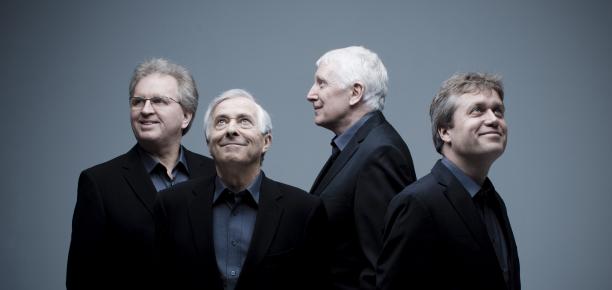
As I write, The Hilliard Ensemble – the English male vocal quartet that has produced countless wonderful recordings of Medieval, Renaissance, Baroque, and contemporary Music – is onstage at Wigmore Hall, where they are celebrating a 40-year career and singing their final concert.
Much has been said about the Hilliard’s music and enormous legacy, but the ending of this group has caused me to reflect on what their influence has personally meant to me as a composer.
It was my encounter with the Hilliards’ recordings of new music around eight years ago that was perhaps the single biggest epiphany leading me to pursue classical training in composition and to channel my artistic efforts into concert music.
At around age 18, I found myself at a crossroads. Having independently released my one-woman-band progressive rock opus Tempus, my next steps were unclear for reasons both practical and creative. I felt that my current approach was no longer fulfilling my artistic inclinations and professional ambitions.
Although I first began listening to The Hilliard Ensemble because of my long-standing love of Early Music, it was their recordings of contemporary music that showed to me that the kinds of artistic expression I’d been seeking through other genres and methods of music making could be realized through “classical” performance practices, aesthetics, and venues. The album A Hilliard Songbook, in particular, opened up a world of possibilities to me.
The new music The Hilliard Ensemble recorded was unlike anything I’d heard. And, unlike the broad gloss of choral music, or the 19th century-derived aesthetic of modern operatic singing (both of which I have come to appreciate in their own right), there was an intense, jewel-like delicacy in the Hilliards’ singing. In one of my old favorites among their interpretations of newly-composed music, Stephen Hartke’s Cathedral in the Thrashing Rain, every note, rhythm, and gesture emerges in sharp relief; every opportunity for expression is captured and realized, born out of a tremendous sensitivity to text, line, and harmony.
Their performances were immaculate yet intimate; technical, yet seemingly effortless; overwhelmingly beautiful but, above all, utterly human. They blended their voices in a way that was both balanced yet individualistic, taking full advantage of the inherent transparency of the small ensemble sound. Whenever I have listened to this group, I hear not only “The Hilliard Ensemble” but the perfectly allied voices of David James, Rogers Covey-Crump, Steven Harrold (or John Potter), and Gordon Jones, plus the ineffable ambience that the combination of those voices produces.
Although I had certainly experienced classical music before hearing The Hilliard Ensemble, through their recordings I began to realize that contemporary concert music might be “my” music.
It was with all of this ringing in my ears that in 2007 I wrote a 12-minute setting of Saint Augustine for solo soprano, countertenor, tenor, and bass, titled Memory (listen to an excerpt). This was my first completed composition that was 1) fully notated, 2) envisioned for classically trained performers, and which 3) didn’t involve drum set and/or guitar! I was extremely fortunate to have the opportunity to record this work with top-notch singers in NYC (members of Lionheart, et al).
This recording went into my artistic portfolio and helped me to secure spots and scholarships in several composition programs (including New England Conservatory, where I went on to pursue my Bachelor of Music). Now, seven years later, I’ve completed a Master of Music at New York University and produced compositions and performances for chamber ensembles, orchestra, multimedia, and voice, including a staged one-act monodrama for tenor, The Coming of Spring, .
As The Hilliard Ensemble ends its long career this evening, I’m faced with the knowledge that I’ll never have the opportunity of fulfilling my “bucket list” dream of composing a work to be performed by this group. However, while contemplating the pivotal influence that the Hilliards had on my path, I renew my hope that I might someday have an opportunity to revisit writing for small vocal ensemble and continue following the inspiration of this group in future, unforeseen ways.